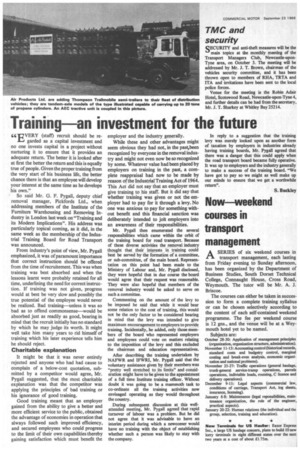Training an investment for the future
Page 72

If you've noticed an error in this article please click here to report it so we can fix it.
VERY (staff) recruit should be regarded as a capital investment and no one invests capital in a project without nurturing it to ensure that it provides an adequate return. The better it is looked after at first the better the return and this is equally true of people. Given the proper training from the very start of his business life, the better chance there is that an employee will develop your interest at the same time as he develops his own."
So said Mr. G. F. Pygall, deputy chief removal manager, Pickfords Ltd., when addressing members of the Institute of the Furniture Warehousing and Removing Industry in London last week on "Training and its Modern Implications". His address was particularly topical coming, as it did, in the same week as the membership of the Industrial Training Board for Road Transport was announced.
From industry's point of view, Mr. Pygall emphasized, it was of paramount importance that correct instruction should be offered from the time of recruiternent. This was when training was best absorbed and when the lessons learnt were probably retained for all time, underlining the need for correct instruction. If training was not given, progress would at best be very slow and possibly the true potential of the employee would never be realized. Bad training—unless it was so bad as to offend commonsense—would be absorbed just as readily as good, bearing in mind that the recruit initially has no standard by which he may judge its worth. It might well take him many years to rid himself of training which his later experience tells him he should reject.
Charitable explanation It might be that it was never entirely rejected and anyone who had had cause to complain of a below-cost quotation, submitted by a competitor would agree, Mr. Pygall suggested, that the most charitable explanation was that the competitor was applying the principles of bad training or his ignorance of good training.
Good training meant that an employer gained from the ability to give a better and more efficient service to the public, obtained the advantage of economies in operation that always followed such improved efficiency, and secured employees who could progress to the limit of their own capabilities thereby gaining satisfaction which must benefit the employer and the industry generally.
While these and other advantages might seem obvious they had not, in the past,been recognized by everyone in the removal industry and might not even now be so recognized by some. Whatever value had been placed by employers on training in the past, a complete reappraisal had now to be made by reason of the Industrial Training Act of 1964. This Act did not say that an employer must give training to his staff. But it did say that whether training was given or not the em ployer had to pay for it through a levy. No one was anxious to pay for something without benefit and this financial sanction was deliberately intended to jolt employers into an awareness of their responsibilities.
Mr. Pygall then enumerated the several responsibilities which came within the orbit of the training board for road transport. Because of these diverse activities the removal industry thought that their interests in training could best be served by the formation of a committee, or sub-committee, of the main board. Representation on this point had been made to the Ministry of Labour and, Mr. Pygall disclosed, they were hopeful that in due course the board would agree that their request was reasonable. They were also hopeful that members of the removal industry would be asked to serve on such a committee.
Commenting on the amount of the levy to be imposed he said that while it would bear some relation to the cost of training, this would not be the only factor to be considered bearing in mind that the levy was intended to give maximum encouragement to employers to provide training. Incidentally, he added, only those members of the board who represented employers and employees could vote on matters relating to the imposition of the levy and this excluded the chairman and education representatives.
After describing the training undertaken by NAFWR and IFWRI, Mr. Pygall said that the voluntary assistance given by their members was "pretty well stretched to its limits" and consideration might have to be given to the appointment of a full time Institute training officer. Without doubt it was going to be a mammoth task to co-ordinate all the training activities now envisaged operating as they would throughout the country.
During subsequent discussion at this wellattended meeting, Mr. Pygall agreed that rapid turnover of labour was a problem. But he did not agree that it was advisable to have an interim period during which a newcomer would have no training with the object of establishing whether such a person was likely to stay with the company. In reply to a suggestion that the training levy was merely looked upon as another form of taxation by employers in industries already having training boards, Mr. Pygall agreed that there was a danger that this could apply when the road transport board became fully operative. It was up to employers and the industry generally to make a success of the training board. "We have got to pay so we might as well make up our minds to ensure that we get a worthwhile return".
S. Buckley








































































































































































































































































































































































